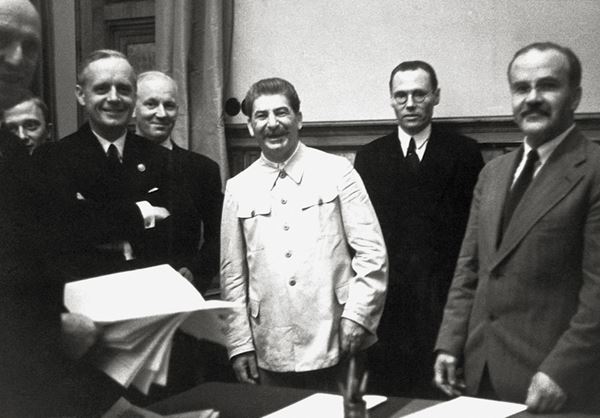News
Hungarian Historian Cautions Against Repeating the Arguments that Stalin Himself Crafted in His Own Defence
In a recent article published with the National University of Public Services in Budapest, Research Fellow of the Hungarian Academy of Sciences Miklós Mitrovits has suggested that the Soviet Union bears significant responsibility for the outbreak of World War 2. The article was intended to dispel common myths around the Molotov-Ribbentrop Pact of 1939, which many falsely claim was “forced” upon the Soviet dictator Joseph Stalin, and was a purely defensive measure intended to preserve peace in Europe.

“The anti-Fascist Left and supporters of the Soviet Union”, Mitrovits alleged, “were and are still unwilling to face Stalin’s real nature and his readiness to make a pact with Hitler and eradicate independent states”. The result is, he claimed, “repeated efforts to blame powers of Western Europe or even, lately, Poland”, for the Pact.
For instance, the Munich Agreement of 1938, according to which Britain and France assented to German annexation of certain Czechoslovak territories, is often invoked to defend the Pact as being ‘forced’ upon Stalin due to Western appeasement of Hitler.
Yet, Mitrovits argued, archival evidence demonstrates Stalin’s apathy towards Czechoslovakia. The Soviets, he affirmed, were “happy to stay away from the issue of Czechoslovakia”, perhaps because Stalin was anticipating a general conflict among the capitalist and fascist countries that would result in widespread proletarian revolution.
As for revisionist accusations that Poland was ‘pro-German’, thereby justifying the Soviet invasion in 1939, Mitrovits asserted that Poland, in reality, sought to “keep equal distance from Berlin and Moscow and avoid provoking either”. Contrastingly, both of Poland’s militaristic neighbours were, according to Mitrovits, vehemently hostile towards the very existence of the Polish state. As Stalin is quoted as saying on September 7, 1939: “Currently, the annihilation of [Poland] means that there is one less bourgeois Fascist state. What is wrong about crushing Poland if it results in spreading Socialism in new territories?”
Soviet Motives Encompassed Territorial Expansion and Economic Interests
As for the true reasons the Soviet Union signed the Pact, Mitrovits pointed again to the available archival evidence, maintaining it reveals “expansionist imperial policies” targeting the territories conquered across 1939-1940.
There were also significant economic motives, illustrated by Soviet-German trade agreements which saw the Soviet Union ship hundreds of thousands of tonnes of raw materials, including oil, grain, cotton, iron ore, and copper, to Germany. In return, the Soviet Union benefited from German military, technological, and mechanical innovations. By supplying the German war machine and assisting in its partition of Europe, Mitrovits concludes, the Soviet Union “was Hitler’s main ally in his war against Western Europe”.
Denial of True Soviet Motives Persists Today
Ending with a caution about present-day veneration of Stalinist foreign policy, Mitrovits indicated that many such arguments were employed by Stalin himself after the war, retrospectively justifying the Pact as a ‘necessary’ measure. “One needs to be cautious”, he warned, “and avoid repeating the arguments that Stalin himself crafted in his own defence”.
Miklós Mitrovits is a Hungarian historian of twentieth century Central Europe. He earned his Ph.D. at the Doctoral School of Eötvös University in 2009, and is currently a Research Fellow of the Institute of History at the Hungarian Academy of Sciences. His 2020 article, ‘Background to the Molotov–Ribbentrop Pact: Legends and Facts’, appeared in Central European Horizons, a journal published by the Institute of Central European Studies at the National University of Public Services in Budapest, Hungary.